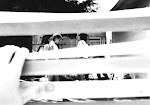Imagine a world where a high school student expresses an opinion to a friend. A few days later the student disappears. Family and friends question and search, receive no answers. The student has become one of the "disappeared" -- thousands of people, whose arrests as enemies of the state are never acknowledged, whose fates are never known.
Sounds likea dystopian novel, right? But this actually happened, in the 1970s, in Argentina. It happened in a lot of other places, too. And it still happens today. A large part of the world's population lives through its own variation on the theme -- omnipresent police, personality cults, corruption, weird rules, fear.
YA dystopian fiction often tends toward the vague and the shadowy. Evil omnipresent governments, brutal police, states based on scarcity or overly advanced technology. But governments are composed of human beings and human beings are complicated. They collaborate, but they also resist. They love their country, they may fight for it and die for it, and yet believe the whole time that their government is wrong. Reading about the lives of people in Poland, Nazi Germany, Argentina, Iran, China I am struck by the terrible choices they had to make. It feels like there is a huge difference between their world and the comparatively safe, sane democratic world I grew up in.
I think it's this gulf that drives YA dystopian fiction, this fear of "what if it happened here?" But I wish YA fiction derived more of its details from the real-life experiences of totalitarian societies, that it weren't so stuck on the single-freedom-fighter-leads-a-revolution theme. Because in real life, that doesn't happen very often. Go back to the example of Argentina for a minute. The Argentine junta that ruled in the 1970s was replaced -- through not so much a revolution as a collapse -- by a democratic government in the 1980s. Argentina has since struggled with corruption, economic problems and a disinclination to deal with the ugliness of the past. But it's basically a free country. In real life, totalitarian governments are often not quite as powerful as they appear to be. People resist in thousands of little ways, people push towards freedom. And that complexity, the gritty reality of daily life, is a great story.
Friday, December 7, 2012
Subscribe to:
Post Comments (Atom)








No comments:
Post a Comment